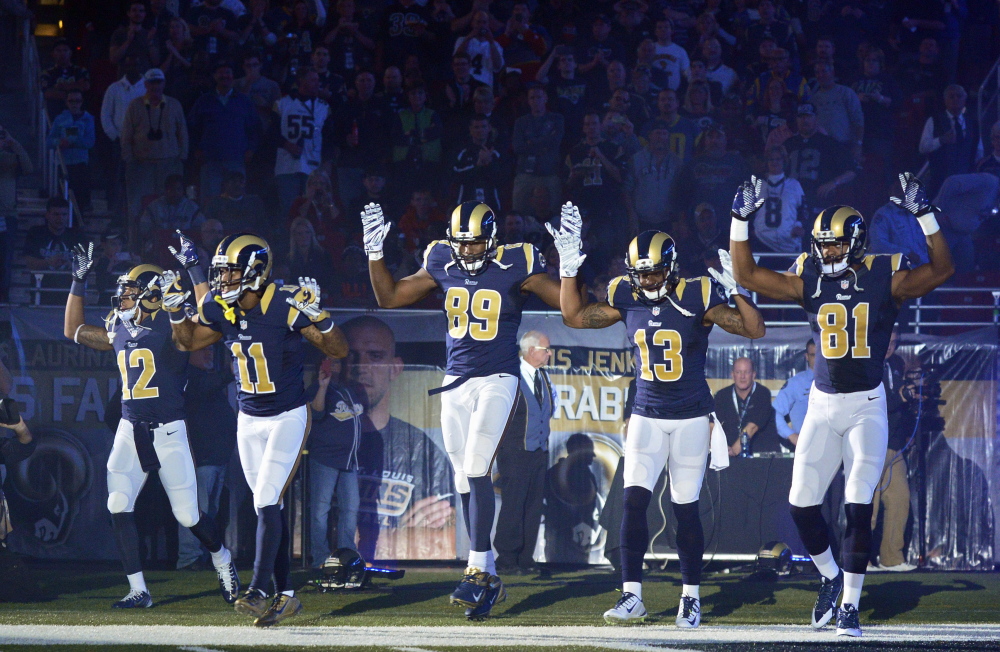The St. Louis Rams may have walloped the Oakland Raiders 52-0 Sunday, but they lost fans among the local police, who were angered by a pregame gesture meant to show solidarity with Ferguson, Missouri, protesters.
The St. Louis Police Officers Association released a statement of righteous indignation after five Rams — Tavon Austin, Stedman Bailey, Kenny Britt, Jared Cook and Chris Givens – walked onto the field with a “Hands Up. Don’t Shoot!” pose before the game. Edward Jones Dome, the Rams’ home stadium, is about 12 miles from Ferguson, the site of ongoing protests since a grand jury decided not to indict Officer Darren Wilson for fatally shooting teenager Michael Brown. The officers’ association called the demonstration “tasteless, offensive and inflammatory,” and demanded “the players involved to be disciplined and for the Rams and the NFL to deliver a very public apology.” The players were not penalized by the team or by the NFL.
The NFL isn’t used to letting outside groups pressure it into doing anything unless absolutely necessary (i.e. threatening its sponsorship dollars) and has made the smart decision to stay out of this one. “We respect and understand the concerns of all individuals who have expressed views on this tragic situation,” NFL vice president of communications, Brian McCarthy, said in a statement.
Punishing the Rams for a peaceful, pregame demonstration would have been both unprecedented and unwise given the ongoing battles between the league and the players’ union over disciplinary overreach. It also would have played directly into the police association’s plan: making the gesture into much more than it was to further its side of the Ferguson narrative. The statement accused the players of calling “a now-exonerated officer a murderer,” which is a rather egregious use of poetic license in interpreting a gesture that didn’t cause much of a stir inside the stadium itself.
Blowing up the Rams’ demonstration simply gave the police a launchpad for a news release to re-emphasize the “discredited witnesses” who accused the officer of wrongdoing and the “mountains of evidence” released by the grand jury – with no mention of the inconsistencies and multitude of questions left unanswered – all with a guaranteed publicity bump, courtesy of the unwitting NFL. It also provided yet another chance to call the protesters “violent thugs,” adding to the long list of racially charged language used to describe both the community and the victim himself. It’s part of an overarching strategy to play up the supposed facts while using language that appeals to emotions and fears.
But as Britt said after the game, the Rams weren’t “taking sides” in a situation the players all described as “a tragedy.” “We wanted to show that we are organized for a great cause and something positive comes out of it. We wanted to let the community know that we support the community.”
“Violence should stop,” Bailey added. “There’s a lot of violence going on here in St. Louis.”
It would be naive to think that a league that is 67 percent African-American wouldn’t have some players who would directly relate to what’s happening in Ferguson. According to ProPublica, black male teens are 21 times more likely to be shot dead by police than their white counterparts. The disparity continues through to pro football: Black NFL players are arrested at 10 times the rate of white players.
Ferguson has brought out the community of athletes, normally interested only in maintaining their finely tailored images, to publicly express their concerns with the ruling. .
With the ever-increasing corporatization of sports, it’s rare to see the kind of genuinely human display the Rams gave us in their pregame gesture and postgame interviews. The athletes of yesterday often call for the stars of today to grow a social consciousness, constantly in search of a modern-day Muhammad Ali. Yet when they do show a shred of humanity, too many of us tell them to “stick to sports” and resent their use of their platforms.
It’s hard to look at the Rams’ gesture and not think of the 1968 Summer Olympics, when U.S. track and field teammates John Carlos and Tommie Smith gave the Black Power salute during a medal ceremony. “The greatest problem is we are afraid to offend our oppressors,” Carlos said in 2012. Years earlier, he had said, “We knew that what we were going to do was far greater than any athletic feat.”
It’s notable how little has changed since then: That a group of black men making a quietly powerful statement with the American flag and the national anthem as their backdrop can so offend our polite sensibilities; that this rude reminder that there are two Americas and one of them is decidedly not for black people is a great imposition, particularly when it comes during a sporting event.
“There are things out there bigger than football and we notice that,” Austin said after Sunday’s game. It seems athletes haven’t completely lost their political perspectives after all.
Copy the Story LinkSend questions/comments to the editors.



Success. Please wait for the page to reload. If the page does not reload within 5 seconds, please refresh the page.
Enter your email and password to access comments.
Hi, to comment on stories you must . This profile is in addition to your subscription and website login.
Already have a commenting profile? .
Invalid username/password.
Please check your email to confirm and complete your registration.
Only subscribers are eligible to post comments. Please subscribe or login first for digital access. Here’s why.
Use the form below to reset your password. When you've submitted your account email, we will send an email with a reset code.